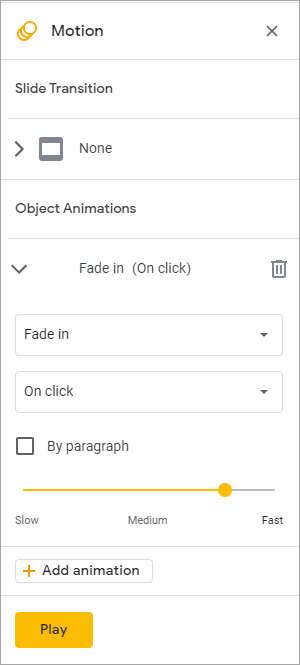Make an Object Appear and Disappear in Google Slides Using Entrance and Exit Animations
by Avantix Learning Team | Updated April 29, 2022
Applies to: Google Slides® (Windows)
In Google Slides, you can add both entrance and exit animations to make an object appear on a slide and disappear during a slide show. The animation can occur automatically or on click. An object is typically a shape, image, text placeholder or text box.
Recommended article: How to Add Audio in Google Slides
You will need to log in to your Google Drive account to work with Google Slides presentations. Go to drive.google.com to access Google Drive and your Google apps. Open the presentation with the slide(s) you want to animate.
Displaying the Motion pane
To apply animations in Google Slides, you will need to display the Motion pane.
To display the Motion pane by right-clicking:
- Right-click an object on a slide.
- Choose Animation from the drop-down menu. The Motion pane appears.
To display the Motion Pane using the Google Slides menu:
- Click View in the menu at the top of the slide. If the menu is not displayed, press Ctrl + Shift + F.
- Click Motion in the menu.
To display the Motion pane using a keyboard shortcut, press Ctrl + Alt + Shift + B.
The Motion pane appears and displays options for transitions that occur between slides during a slide show and options for animations that can be applied to objects.
You may have to expand the Object Animations area by clicking the arrow below Object Animations.
Adding an entrance animation to make an object appear
To apply an entrance animation to an object to make it appear on click:
- Select an object on a slide. For text objects, click in the text box or placeholder or click its edge. Google Slides should apply a default animation to the object. If it doesn't add an animation, click Add Animation.
- In the Motion pane, click the arrow below Object Animations to expand it.
- Choose Appear or Fade in from the Animation Type drop-down menu. Fade to expand it. You could also choose Fly in from left, Fly in from right, Fly in from bottom, Fly in from top or Zoom in.
- From the Start Condition drop-down menu, select an option to start the animation. The default is On click but you can also select After previous or With previous which would occur automatically when you run the slide show (after or with the previous animated object).
- If the object contains text, you can select or check By paragraph if you want. You may want to select this option if you want to animate bulleted text in a placeholder or text box
- To change the speed of the animation, drag the Duration slider between Slow and Fast. Drag left to slow the animation down or right to speed it up.
In the example slide below, the user wants to animate the selected text object to make it appear by fading in:
The Motion pane appears as follows with an entrance animation to fade in:
Adding an exit animation to make an object disappear
To apply an exit animation to an object to make it disappear on click:
- Select an object on a slide. For text objects, click in the text box or placeholder or click its edge.
- In the Motion pane, click Add Animation.
- Choose Disappear or Fade out from the Animation Type drop-down menu. You could also choose Fly out from left, Fly out from right, Fly out from bottom, Fly out from top or Zoom out.
- From the Start Condition drop-down menu, select an option to start the animation. The default is On click but you can also select After previous or With previous which would occur automatically when you run the slide show.
- If the object contains text, you can select or check By paragraph if you want.
- To change the speed of the animation, drag the Duration slider between Slow and Fast. Drag left to slow the animation down or right to speed it up.
The Motion pane appears as follows with an entrance and exit animation:
Editing an animation
To edit an animation:
- Select the object with the animation you want to edit.
- In the Motion pane, click the arrow beside an animation to expand it (if necessary).
- Choose a different animation, start condition and / or duration.
Running a slide show
The final step is to run the slide show to see your object appear and disappear.
To run a slide show, click Slide Show on the top right of the screen. You can also click the arrow to the right of Slide Show and choose Start from Beginning or Presenter View in the menu.
When you run a slide show, if you have selected On click for your animations, you will need to click or press the right arrow to start each animation.
To exit a slide show, press ESC.
Subscribe to get more articles like this one
Did you find this article helpful? If you would like to receive new articles, JOIN our email list.
More resources
How to Add Audio in Google Slides
How to Change Margins in Google Docs (2 Ways)
How to Do a Hanging Indent in Google Docs (3 Ways)
How to Insert a Check Mark or Tick Mark in Google Slides (3 Ways)
How to Strikethrough or Cross Out Text in Google Docs (with Shortcuts)
Related courses
Microsoft PowerPoint: Intermediate / Advanced
Microsoft PowerPoint: Design for Non-Designers
Microsoft PowerPoint: Accessible PowerPoint Presentations
Our instructor-led courses are delivered in virtual classroom format or at our downtown Toronto location at 18 King Street East, Suite 1400, Toronto, Ontario, Canada (some in-person classroom courses may also be delivered at an alternate downtown Toronto location). Contact us at info@avantixlearning.ca if you'd like to arrange custom instructor-led virtual classroom or onsite training on a date that's convenient for you.
Copyright 2024 Avantix® Learning
You may also like
How to Insert or Type A with an Accent Mark in Google Docs (À, Á, Â, Ä, à, á, â, or ä) – 6 Ways
You can insert or type a with an accent mark in Google Docs in several ways. You can use built-in tools, online tools, add-ons or keyboard shortcuts (including Alt code shortcuts). The letter a can be inserted with an accent in both upper or lower case. The following are common accents in upper or lower case – À, Á, Â, Ä, à, á, â, or ä.
How to Insert or Type U with an Accent Mark in Google Docs (Ù, Ú, Û, Ü, ù, ú, û, or ü) – 6 Ways
You can insert or type u with an accent mark in Google Docs in several ways. You can use built-in tools, online tools, add-ons or keyboard shortcuts (including Alt code shortcuts). The letter u can be inserted with an accent in both upper or lower case. The following are common accents in upper or lower case – Ù, Ú, Û, Ü, ù, ú, û, or ü
How to Insert or Type O with an Accent Mark in Google Docs (Ò, Ó, Ô, Õ, Ö, ò, ó, ô, õ or ö) – 6 Ways
You can insert or type o with an accent mark in Google Docs in several ways. You can use built-in tools, online tools, add-ons or keyboard shortcuts (including Alt code shortcuts). The letter o can be inserted with an accent in both upper or lower case. The following are common accents in upper or lower case – Ò, Ó, Ô, Õ, Ö, ò, ó, ô, õ or ö.
Google, the Google logo and related Google Drive applications and logos are registered trademarks of Google LLC in Canada, US and other countries.
Microsoft, the Microsoft logo, Microsoft Office and related Microsoft applications and logos are registered trademarks of Microsoft Corporation in Canada, US and other countries. All other trademarks are the property of the registered owners.
Avantix Learning |18 King Street East, Suite 1400, Toronto, Ontario, Canada M5C 1C4 | Contact us at info@avantixlearning.ca










